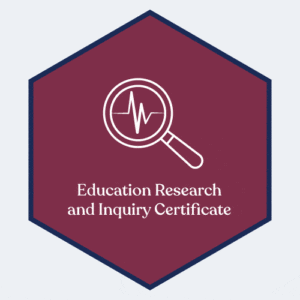JO STAWMAN, Head of School, Quest Primary School, UK
GEMMA PARKER, Director of School Improvement, The Collegiate Trust, UK
Using research evidence is integral to school improvement and good teaching (EEF, 2024). There are multiple sources of research evidence, and in the UK, the 1960s and 1970s saw an emergence of the teacher as researcher, prioritising their professional autonomy and emphasising teaching as a skilled and locally managed activity (Hammersley, 1993). However, since 2010, there has been a significant increase in research evidence being used to inform classroom practice and school change (EEF, 2021), rather than emerging from classrooms. Boyd and Szplit (2017) conceptualise these approaches as an argument between teachers implementing knowledge concerning pedagogical practice versus teachers creating knowledge.
At one multi-academy trustAbbreviated to MAT, a group of schools working in collaboration, governed by a single set of members and directors (Early Years Foundation Stage to Key Stage 4) in the south of England, research evidence is routinely and confidently used to inform policy and practice; however, a decision was made to raise the profile of teacher inquiry by ratifying it within a new performance development policy. This case study details the genesis of this shift, the mechanisms through which the policy was written and implemented, and its impact, including conclusions in the form of recommendations for future practice.
Rationale
The Trust’s stated purpose to build collaboration to deliver exceptional education is reflected in its values and desired outcomes of ‘ambition and collaboration’ and ‘achievement and enjoyment’, respectively. This foundation was the platform for a new performance development policy, designed to also embody the Trust’s commitment to developing its staff and people. The policy set out an evolved mechanism for professional development that was ever-more supportive and developmental; a key priority was to ensure that all colleagues have the skills and support that they need to carry out their role effectively, enabling them to improve their professional practice and to develop as valued and effective colleagues.
What did the Trust do?
The performance development policy was reviewed and the structure of three performance development targets was replaced with a rationale for colleagues to improve a specific area of practice, with clear intentions for impact on pupil outcomes, through critically engaging with research. In essence, teachers were required to engage with an inquiry question process (IQP), which rested on the identification of a clear and precise inquiry question (IQ), aligned to school development priorities. All teaching staff were required to engage with this process, and some schools voluntarily included other staff, such as learning coaches, within the first year.
John Tomsett, the keynote speaker at a Trust leadership conference in February 2022, laid the foundations for this approach when he shared the implementation and impact of a similar policy at his research school in the north of England. Leaders found it interesting and inspiring; it was an excellent way in which to introduce the practice of teacher inquiry, as it was couched within a relatable context and provided plenty of opportunity for discussion.
The Trust’s director of education consequently launched the proposed performance development policy to Trust leaders during a strategy day, and in the following months this was disseminated more widely to school leadership teams and wider staff during a consultation period. The policy was approved during summer 2022 and implemented during 2023/24.
During the 2023/24 autumn term, school leaders and central team staff supported teachers to develop their IQ; professional development meeting time was used to articulate aims and discuss rationales with expert colleagues. IQs were constructed within the framework of school improvement priorities and teachers’ professional learning interests, and then further underpinned by considering the research, evidence-informed strategies and pedagogy that would likely best result in the intended impact. A structure was provided, as shown in Figure 1, which all teachers personalised.
![Figure 1 is an example structure for IPQ. The text reads: What impact does implementing [the intervention] delivered [duration] have on [outcome] for [participants/setting]? For example: ‘What impact does implementing checking understanding about the meaning of subject-specific maths vocabulary delivered in two maths lessons per week for six weeks have on mathematical reasoning for pupils working just below age-related expectations in Year 5?’](https://my.chartered.college/wp-content/uploads/2024/09/Parker-Stawman-Figure-1.png)
Figure 1: Example structure for IPQ
Senior leadership teams reviewed IQs to ensure alignment with school or team priorities. Methodologies were chosen to support effective implementation and a performance development plan was used to record the ongoing work.
Teachers conducted pre-intervention assessments of targeted pupil groups to gather baseline data, and during the spring term, teachers implemented their intervention, ensuring fidelity to their plan. At an interim point, teachers were observed to evaluate implementation of the IQ, to support and develop practice and to provide opportunities for professional dialogue around meeting the aim of the IQ.
In the summer term, teachers carried out post-intervention assessment to understand the impact of the intervention on pupils. They also evaluated and summarised the impact of the IQP on their professional learning.
Impact
In summary, through the IQP, teachers engaged with professional learning, which empowered them to embed effective pedagogical strategies across their practice. One teacher summarises its impact, saying ‘through the IQP, I put into practice, in a formal way, something I always thought about doing but never ended up trying in any serious way’.
Eighty-one per cent of teachers reported that the IQP improved a specific area of their practice, with 30 per cent rating this as a strong impact. Similarly, 81 per cent of teachers agreed that engaging with the IQP enabled them to reflect on progress and improvements made. Many teachers reported that the tight focus intrinsic to the IQP was important, as it concentrated efforts and, by isolating the intervention, allowed for impact to be ascertained: ‘It has allowed me to look at the planning of lessons in a different light. By focusing on one specific thing, I have been able to really evaluate the impact of this.’
Across the Trust, this incorporated a range of areas, including:
carefully considering evidence-based strategies to employ effective feedback to my Year 11 classes when they were doing assessment practice, rather than the less effective feedback I had been providing for years previously.
live modelling and live marking to help improve writing PEEL [point, evidence, explain, link] paragraphs for SEND [special educational needs and disability] students. This has also impacted other areas of my practice, as live modelling and marking have become far more routine in all my lessons.
The alignment with whole-school priorities was seen as advantageous by some teachers, who appreciated being encouraged to ‘reflect and try something different’; however, others found this limiting and felt ‘restricted by having to fit my IQ into a whole-school box, rather than flex to my personal and departmental needs’. Data showing that 83 per cent of teachers agreed that the IQP contributed to school improvement, with nearly 20 per cent believing this impact to be strong, suggests that parameters evolving from whole-school development plans had the desired impact.
It was clear from the outset that a successful IQP was defined by the implementation of a viable IQ. However, a positive impact of the intervention on pupil outcomes was naturally desirable, and in summary, many teachers reported clear positive impacts on student outcomes, with no detrimental effects reported. For example:
Pupils were able to apply taught knowledge and previous sentences/drafts to their final piece of writing.
It has improved the proportion of students thinking during my lessons.
More pupils are now aspiring to use tier 2 vocabulary.
Where impact was less evident, this was attributed to an implementation period that was too short or where teachers felt that the formal structure of an IQP was not necessary for them, as a reflective/adaptive cycle was their usual practice.
Naturally, any Trust-wide roll-out is a significant undertaking, and the IQP reflects this. It is clear that there have been operational challenges during the first year. Teachers report real variation in key areas, including mentor support, mentor expertise, sharing of key documentation and expectations regarding related paperwork. Nearly 70 per cent of teachers reported that the IQ process increased their workload compared to the three targets that had previously comprised the performance development policy. The same proportion of teachers also felt that more directed time should have been dedicated to the IQ process. In summary, this has meant variable levels of fidelity to the IQP, enjoyment, satisfaction and impact on pupil outcomes/professional learning.
2024/25 and beyond
As the first year of the IQP draws to a close, there are a number of steps that could be taken to embed and improve the process for next year. These focus on the contextual factors that affect implementation, namely systems, structures and people (Sharples et al., 2024).
Firstly, sharing findings is critical. We aim to disseminate pen portraits, focusing on positive outcomes from the IQP on either professional learning or pupil outcomes. Doing so will celebrate success and provide inspiration. We also aim to share how the IQP will develop, following reflection at a range of levels across the Trust. This values teachers’ perspectives and demonstrates a Trust commitment to their experiences and development.
Secondly, there needs to be improved training for mentors and those school-based colleagues who are leading the local roll-out. Specifically, this needs to focus on expectations of paperwork and availability of central resources, such as the Mentor Handbook. Mentors also need to be trained more fully to better support teachers to work within school-wide parameters to address their own developmental needs and those of their classes in order to write IQs that will have impact. The multi-layered approach needs to be clarified so that teachers can appreciate the impact that their IQP has towards whole-school improvement, as well as at a local level for individuals. This should cement the position of the IQP as a valuable vehicle for professional development, even for those teachers who already see themselves as reflective practitioners who adapt their practice.
Conclusion
The first year of the IQP saw a positive impact on teachers’ professional learning and teachers’ assessment of impact on pupils. The foundation has been laid and the blocks that need to be built have been identified. One teacher’s reflection is a pertinent summary; they say, ‘I really believe in the IQ approach, I love the concept’, which prefaces a range of improvements that they suggest. This approach demonstrates their commitment to the process. Similarly, by heeding outcomes from the inaugural year, the Trust is in a strong position to move forward and embed the IQP successfully during 2024/25.












